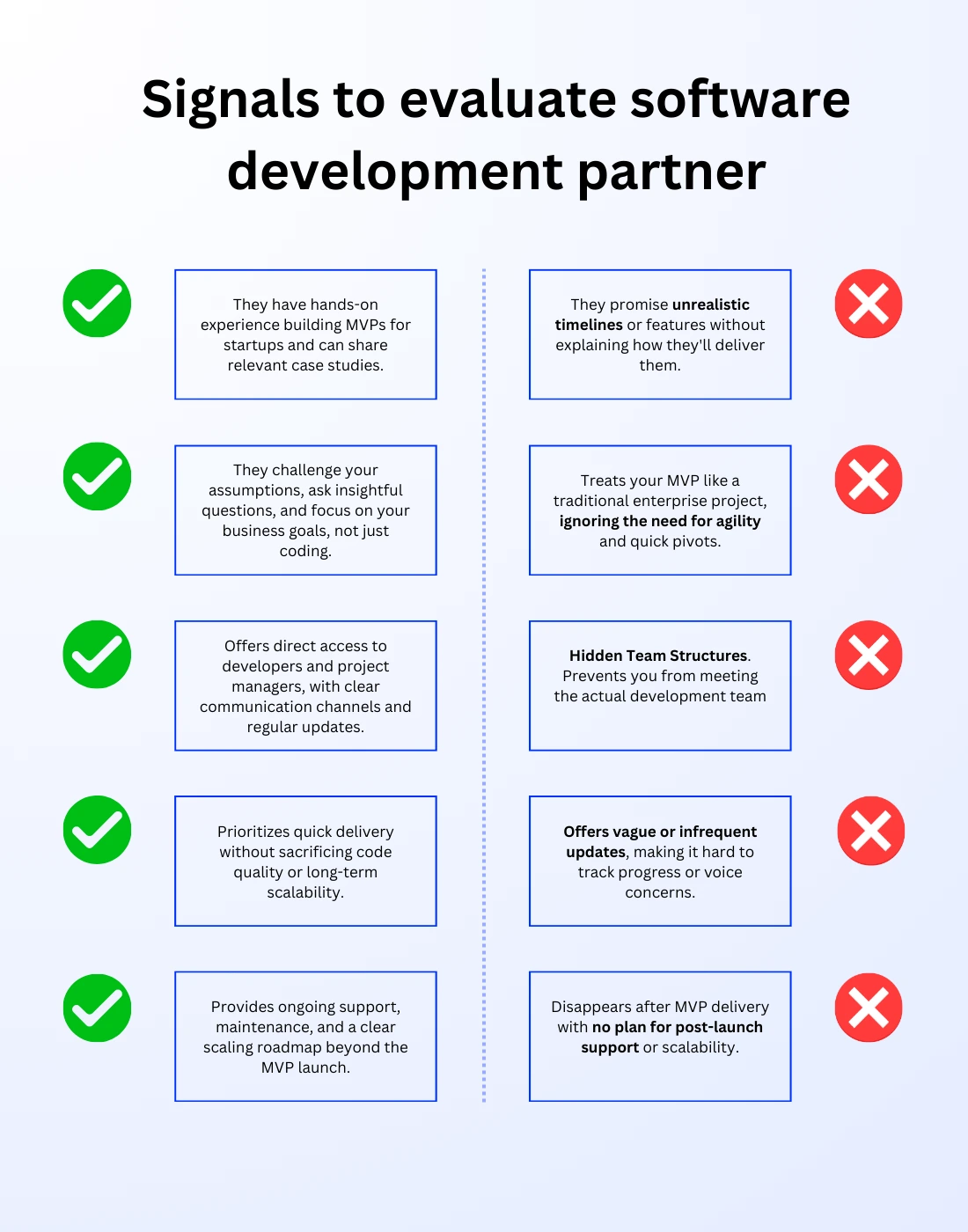Back to all Articles
Karol Andruszków
Karol is a serial entrepreneur who has successfully founded 4 startup companies. With over 11 years of experience in Banking, Financial, IT and eCommerce sector, Karol has provided expert advice to more than 500 companies across 15 countries, including Poland, the USA, the UK, and Portugal.
How to Choose a Bespoke MVP Software Development Company for Your Startup?
Updated:
Thu, Apr 17
Reading time: 16 minutes

Bringing a new product idea to life is an exciting but challenging journey. As a startup founder or CTO, you face a series of crucial decisions. One of the most significant being how to choose the right partner for developing your Minimum Viable Product (MVP). The stakes are high.
The right choice can accelerate your path to market and attract investors. The wrong one can waste valuable time and drain your budget.
We wrote this article because we understand the challenges you face.
Working with startups over the years has shown us how overwhelming the search for a top MVP development partner can be. Countless providers are claiming to be “the best”.
Sometimes it’s difficult to separate marketing promises from reality.
Working with startups over the years has shown us how overwhelming the search for a top MVP development partner can be. Countless providers are claiming to be “the best”.
Sometimes it’s difficult to separate marketing promises from reality.
Every vendor highlights their strengths, but how can you tell which ones truly deliver?
How do you evaluate not only technical skills but the ability to understand your vision?
This guide is designed to cut through the noise. In this article, you find practical and actionable insights based in our experience. We dive into what matters most when choosing a custom MVP development partner.
Our goal is simple: to help you understand how to choose a bespoke MVP development company.
Our goal is simple: to help you understand how to choose a bespoke MVP development company.
What is Custom MVP Software Development Service?
Let’s start from the very beginning. MVP is the acronym for Minimum Viable Product. It is a simple version of your product built with only the essential features needed to test your core idea with real users. It allows you to gather valuable feedback without investing in full-scale development. For startup founders and CTOs, it’s a smart way to test ideas in the market with lower risk and cost.
A Custom MVP Software Development Service refers to partnering with specialized software houses to outsource the MVP development process. Rather than develop solution in-house with generic tools, you work with experts who design and develop MVP tailored to your startup’s unique vision and challenges.
Types of Companies Providing Bespoke MVP Development Services
When looking for a partner to develop your bespoke MVP, you’ll find several types of companies offering these services. Each comes with its own advantages depending on your startup’s needs, budget, and timeline. Here are the most common options:
Solo MVP Software Development Company
These agencies focus entirely on providing MVP app development services. They have proven frameworks, dedicated teams, and processes designed to validate ideas quickly. If speed-to-market is your priority, these companies offer efficient and targeted solutions.
These agencies focus entirely on providing MVP app development services. They have proven frameworks, dedicated teams, and processes designed to validate ideas quickly. If speed-to-market is your priority, these companies offer efficient and targeted solutions.
Full-Service Software Development Companies
These companies provide a wide range of services beyond MVP product. This includes full product development, scaling, and maintenance. They’re a good fit if you plan to continue working with the same partner after your MVP launch.
These companies provide a wide range of services beyond MVP product. This includes full product development, scaling, and maintenance. They’re a good fit if you plan to continue working with the same partner after your MVP launch.
Freelancers
Hiring freelancers can be a cost-effective, especially for early-stage startups with tight budgets. However, they lack the project management structure and scalability of larger companies. This can be a challenge in the future as your project grows.
Hiring freelancers can be a cost-effective, especially for early-stage startups with tight budgets. However, they lack the project management structure and scalability of larger companies. This can be a challenge in the future as your project grows.
Choosing the right type of company depends on your goals, available resources, and how much control you want over the MVP development process.
Criteria for Choosing a Bespoke MVP Development Company
Selecting the right bespoke MVP development team can make or break your startup’s early success. As a founder or CTO, you’re not just looking for someone to write code. You need a partner who understands your vision, challenges, and urgency.
Below is the checkbox of essential aspects that your potential partner should understand. The best MVP software development agency should:
Below is the checkbox of essential aspects that your potential partner should understand. The best MVP software development agency should:
Understand the Startup Environment
Your MVP development partner should understand the difference between startup and established company. Startups operate in a world of rapid change, tight budgets, and pressure to deliver results quickly.
Your development partner should not only understand this environment but have working experience. Partner should be prepared for shifting priorities, tight deadlines, and evolving product requirements.
Ask potential mvp partners about their experience working with early-stage startups. Have they successfully adapted to quick pivots? Do they know how to prioritize essential features to meet tight timelines?
Your development partner should not only understand this environment but have working experience. Partner should be prepared for shifting priorities, tight deadlines, and evolving product requirements.
Ask potential mvp partners about their experience working with early-stage startups. Have they successfully adapted to quick pivots? Do they know how to prioritize essential features to meet tight timelines?
Nowadays the right partner should offer more than just technical development. It should support you with validation, user feedback loops, and solutions that won't impact your vision.
To give you a better understanding, below is a comparison of the startup and enterprise approaches to MVP development.

To give you a better understanding, below is a comparison of the startup and enterprise approaches to MVP development.

Keep a Balance Between Speed and Long-Term Scalability
Speed-to-market is often the top priority for startups. You need to launch fast, but rushing can lead to technical debt that becomes a costly problem later.
The right MVP development company will help you achieve the right balance. Delivering a product quickly while maintaining a scalable and maintainable codebase.
The right MVP development company will help you achieve the right balance. Delivering a product quickly while maintaining a scalable and maintainable codebase.
For example, ask MVP team how they follow best coding practices or perform proper documentation. Your MVP is a foundation that should evolve into a full product without costly rework.
Have a Strong Product Thinking
Many development companies can write code, but not all can take ownership of your product and YOUR success.
In other words, there are a lot of agencies on the market that will promise you the moon - just to win the project. Very often such overpromising leads to a burn of your budget without any tangible results.
In other words, there are a lot of agencies on the market that will promise you the moon - just to win the project. Very often such overpromising leads to a burn of your budget without any tangible results.
As a founder or CTO, you don't need a partner who will say YES to all your ideas. You need a partner who challenges your assumptions, provides alternative solutions, and helps you count a few steps ahead.
During initial conversations, pay attention to whether the company asks insightful questions about your business goals, target audience, and revenue model. A team with strong product thinking will help you avoid feature creep.
Provide Transparency at Each Stage of Collaboration
Transparency goes beyond regular updates. It’s about open, direct communication with the actual team working on your product. Your potential MVP development partner should be willing to meet you in person, either by visiting your office or inviting you to theirs.
Meeting face-to-face builds trust and allows to understand the people behind the code.
Meeting face-to-face builds trust and allows to understand the people behind the code.
As a client, you should have the opportunity to speak directly with the developers, designers, and project managers involved.
If a company prevents you from contacting individual team members - it’s a red flag.
Sometimes, this could mean that your project has been subcontracted to another company (often in a cheaper location). Such outsourcing can lead to communication gaps, quality issues, and misaligned expectations.
If a company prevents you from contacting individual team members - it’s a red flag.
Sometimes, this could mean that your project has been subcontracted to another company (often in a cheaper location). Such outsourcing can lead to communication gaps, quality issues, and misaligned expectations.
At Ulan Software, we believe in complete transparency throughout the collaboration process. We invite clients to visit our office and meet the team in person. This direct interaction fosters stronger relationships and ensures alignment from day one.
For example, when we worked with IKEA on delivery service app (via TaskRabbit), we welcomed their team to our office to discuss project F2F. These meetings provided invaluable clarity, built trust, and helped us deliver a solution that met their needs.
For example, when we worked with IKEA on delivery service app (via TaskRabbit), we welcomed their team to our office to discuss project F2F. These meetings provided invaluable clarity, built trust, and helped us deliver a solution that met their needs.
Have Clear Communication & MVP Development Process
Have Clear Communication & MVP Development Process
One of the biggest frustrations startups face when working with external teams is poor communication. Delays, misaligned expectations, and a lack of transparency can derail progress. That’s why clear communication channels and regular updates are the MUST.
Ask potential partners about their communication methods.
Do they offer weekly stand-ups, detailed progress reports, and easy access to project management tools like Jira or Trello?
You want a team that treats you like a partner, not just a client—keeping you informed and involved at every stage.
Do they offer weekly stand-ups, detailed progress reports, and easy access to project management tools like Jira or Trello?
You want a team that treats you like a partner, not just a client—keeping you informed and involved at every stage.
Provide Post-MVP Support and Scalability
Launching the MVP is only the beginning. Once it’s live, you’ll need to analyze user feedback, iterate on features, and plan for scaling.
Not all development companies offer post-launch support, so it’s crucial to confirm this upfront. Unfortunately, there are cases where companies disappear after the MVP stage. They are leaving startups stranded with an unfinished or unmaintainable product.
Not all development companies offer post-launch support, so it’s crucial to confirm this upfront. Unfortunately, there are cases where companies disappear after the MVP stage. They are leaving startups stranded with an unfinished or unmaintainable product.
Why does this can happen? These are the bad practices:
- Short-Term Engagement Mentality. Some vendors focus solely on quick delivery of the MVP and have no interest in long-term partnerships. Once they get paid, they move on to the next client, leaving you without support.
- Subcontracting Without Transparency. In some cases, your project may have been outsourced to a third-party team without your knowledge. Once the initial contract ends, the subcontractor’s involvement stops. As a result, your primary vendor may not be able to provide ongoing support.
- Lack of Technical Documentation. A poorly documented codebase makes it difficult for other developers to pick up the project. This creates unnecessary costs and delays when you need to make changes post-launch.
- Financial Instability or Resource Shifts. Small or less reliable companies may dissolve, downsize, or reallocate resources to higher-paying clients.
These scenarios can be frustrating, costly, and detrimental to your startup’s momentum.
That is why look for a partner who can help with continuous development and scaling.
Having the same team continue beyond the MVP phase ensures a smooth transition and faster implementation of updates.
Having the same team continue beyond the MVP phase ensures a smooth transition and faster implementation of updates.
Have Experience with MVP Product and Startups
Why? Building an MVP for a startup requires a unique skill set that goes beyond just knowing an industry. It involves understanding how to move quickly, adapt to change, and balance speed with functionality.
Startups operate under tight deadlines, limited budgets, and market uncertainty. An experienced MVP development team knows how to prioritize core features and iterate wisely.
Companies that only have industry knowledge lack the agility needed to manage the unpredictable nature of early-stage product development. If a team has worked on enterprise-level projects in your sector doesn’t mean they can effectively deliver a lean, testable MVP for a startup.
Companies that only have industry knowledge lack the agility needed to manage the unpredictable nature of early-stage product development. If a team has worked on enterprise-level projects in your sector doesn’t mean they can effectively deliver a lean, testable MVP for a startup.
💡 Tip for You!: One of the strongest signals of a company’s capability is whether they have built and launched their own product in-house. If your partner has gone through the process of ideating, developing, and bringing their product to market - they understand your challenges. In other words, they've been in your shoes. From budgeting and user research to commercialization, and post-launch.
Flexible Engagement Models for Startup MVP Product Development
If your bespoke MVP development company offers flexibility in engagement models is more than just a nice-to-have. It’s a key factor that can significantly impact your project’s success in the future.
Startups operate in dynamic environments, where needs and priorities evolve quickly. That’s why working with a partner that offers various engagement models (and even the ability to mix them) is a valuable asset.
For example, many startups prefer to build their MVP under a fixed-price model to keep costs predictable during the initial phase. Once the MVP is launched and the product enters an iterative development cycle, you might want to shift to a time-and-materials model.
This allows to implement changes based on user feedback without contract limitations. Companies that can easily adapt to such transitions show they truly understand the needs of growing startups.
This allows to implement changes based on user feedback without contract limitations. Companies that can easily adapt to such transitions show they truly understand the needs of growing startups.
However, very few companies go beyond standard engagement models. Ulan Software is one of those rare exceptions. Besides the fixed price, T&M and we offer a dedicated team-building model. We created this model specifically for startups looking for continuity, scalability, and deep integration.
Here’s how our dedicated team-building approach works:
Step 1. Recruitment from scratch
We manage the entire recruitment process for you and build a team tailored to your project’s specific requirements. All recruitment costs are covered by us. So you can concentrate on your product and business strategy rather than hiring.
We carefully select developers, designers, and project managers who meet technical needs and fit your product vision.
We carefully select developers, designers, and project managers who meet technical needs and fit your product vision.
Step 2. One roof, full focus
Once assembled, your dedicated team works exclusively on your project within Ulan Software’s offices. This setup ensures:
✔️ Consistent communication and aligned workflows
✔️ A team fully immersed in your product’s goals and challenges
✔️ Faster decision-making and fewer misunderstandings
Best of all, you don’t need to worry about the administrative burdens of employment. We handle everything related to human resources - employee well-being, holidays, leaves, and payroll. You get the focus of an in-house team without the operational headaches.
According to statistics, Startup owners spend around 40% of their working hours on tasks that do not generate income. These are hiring, HR tasks, and payroll.
According to statistics, Startup owners spend around 40% of their working hours on tasks that do not generate income. These are hiring, HR tasks, and payroll.
Step 3. Ownership transfer (if needed)
After two years, you have the option to take full ownership of the team that’s been dedicated to your project from day one.
This means you integrate them into your organization without the usual recruitment challenges. No lengthy hiring processes and onboarding delays - the team already knows your product inside and out.
This means you integrate them into your organization without the usual recruitment challenges. No lengthy hiring processes and onboarding delays - the team already knows your product inside and out.
You overcome knowledge transfer issues that often arise when switching providers or starting fresh with an in-house team. Instead, you have a fully functional, well-coordinated team ready to continue developing, scaling, and supporting your product under your direct leadership.
💡 Why does this matter for startups?
Startups often face the dilemma of choosing between outsourcing and building an internal team. Our dedicated team-building model provides the best of both worlds. Agility during the early stages and long-term continuity as you grow. It’s a solution designed to adapt to your evolving needs, helping you maintain momentum while preparing for the future.


Questions to Ask a MVP App Development Company
Ask the right question to a potential MVP development partner to evaluate capabilities. Below is a comprehensive list of high-level strategic and technically deep questions.
All of them aligned with the key criteria discussed earlier. These will help you identify the best MVP development partner.
Whether it can meet your specific needs and avoid common pitfalls in the MVP development process.
All of them aligned with the key criteria discussed earlier. These will help you identify the best MVP development partner.
Whether it can meet your specific needs and avoid common pitfalls in the MVP development process.
✅ Questions to Assess Startup Experience and Product Understanding
- How many MVPs have you developed for startups, and what were the outcomes?
- What types of MVP software have you developed? (web, platform, mobile app)
- Can you share examples where you had to pivot or adapt mid-project? How did you handle it?
- How do you prioritize features when working with startups that have limited budgets and tight deadlines?
- How do you approach lean product development while ensuring core functionality?
- What methods do you use for rapid prototyping and user feedback integration?
- Can you explain how you balance speed with technical debt management?
✅ How to Determine Scalability and Technical Capabilities
- How do you ensure that the MVP can be scaled into a full-fledged product without major rewrites?
- Can you provide examples of projects where you built an MVP that later scaled to a large user base?
- What technologies and architectural patterns do you use to support scalability?
- What types of architectures do you have experience with? Have you worked with monolithic, microservices, or serverless architectures?
- Based on my startup’s needs and long-term goals, which architecture would you recommend for the MVP and why?
- How do you handle code documentation to ensure future developers can work on the project seamlessly?
✅ Evaluating Product Strategy and Discovery Process
- How involved are you in refining the product idea and advising on the MVP’s feature set?
- Do you provide a software product discovery service? If so, what does it include? (read about discovery services for software development)
- Can you share a situation where you challenged a client’s initial concept and improved the outcome?
- How do you translate business requirements into technical solutions?
- How do you validate assumptions regarding user needs and technical feasibility before development starts?
- Do you provide UX/UI workshops or design sprints as part of the MVP development process?
✅ Communication Approach
- How often will we have progress meetings or status updates?
- Do you follow Agile development principles?
- Do you conduct daily stand-up meetings? If so, how are they structured, and will I be involved?
- What project management tools do you use to keep clients informed?
- Can I directly communicate with the developers, designers, and project managers working on my project?
- How do you handle communication in agile workflows?
- What’s your escalation process if something isn’t progressing as planned?
- How do you document decisions made during sprints to avoid future miscommunication?
✅ Question About Transparency
- Are you open to face-to-face meetings at your office or ours to meet the team?
- Can I meet all the team members who will work on my project before we start?
- Will I have visibility into who is working on my project and what their roles are?
- How do you ensure transparency when working with remote or distributed teams?
- Can you provide a clear team structure, including roles, responsibilities, and backup resources?
✅ Post-MVP Development and Support
- Do you offer ongoing support and maintenance after the MVP is launched?
- How do you handle post-launch iterations and feature expansions?
- Have you ever continued development with the same team post-MVP for a long-term project?
- What type of software maintenance services do you porvide?
- What’s your process for collecting and implementing user feedback post-launch?
- How do you ensure the product’s architecture supports both immediate needs and long-term growth?
- Can you provide a roadmap for scaling the infrastructure once user numbers increase?
✅ Assessing Minimum Viable Product Experience
- Can you share lessons learned from working with early-stage companies?
- Have you built your own product? If so, what challenges did you face, and how did you overcome them?
- How do you balance building an MVP that’s lean but still offers a great user experience?
- How do you ensure the MVP is production-grade rather than just a prototype?
- Can you walk me through your process for ensuring rapid development while avoiding common startup pitfalls?
✅ Exploring Engagement Models
- What engagement models do you offer? Can I switch between them during the project lifecycle?
- Do you offer any unique engagement options tailored for startups?
- How do you manage budget overruns or scope changes in flexible engagement models?
- What happens if I need to scale the team mid-project—how quickly can you adapt?
Location often plays a significant role in selecting an MVP development partner. To better understand how different regions compare, check out our article: Comparing MVP Partners: US MVP Development Agency or Eastern Europe Services
When to Hire a Bespoke MVP Development Company
Your startup may lack the technical expertise or the skills to build an MVP. In this case, hiring a custom MVP development company can be the best solution. Their experience and dedicated teams will help you avoid costly mistakes. For early-stage startups racing against the clock, this is especially valuable.
Another key reason to consider outsourcing is when internal resources are stretched thin. Recruiting and assembling an in-house team can take months and increase development cost.
Time most valuable resource startups can’t afford to lose. Working with a development company eliminates delay, so you can focus on your business rather than hiring.
Still refining your product idea? Many MVP development companies offer software project discovery service to help with validation.
These service help define your target audience, core features, and project roadmap. For founders who are uncertain about what to build first, this can prevent costly mistakes.
Another key reason to consider outsourcing is when internal resources are stretched thin. Recruiting and assembling an in-house team can take months and increase development cost.
Time most valuable resource startups can’t afford to lose. Working with a development company eliminates delay, so you can focus on your business rather than hiring.
Still refining your product idea? Many MVP development companies offer software project discovery service to help with validation.
These service help define your target audience, core features, and project roadmap. For founders who are uncertain about what to build first, this can prevent costly mistakes.
When to Develop Custom MVP Software In-House
Working with an MVP development company can seem challenging at first glance. Success depends on clear communication, structured processes, and a collaborative approach. Below are actionable tips to ensure a smooth partnership and a high-quality MVP:
Having full control of the development process is another advantage. Some founders and CTOs prefer to manage workflows directly.
Having full control of the development process is another advantage. Some founders and CTOs prefer to manage workflows directly.
However, this route is not without its challenges. Recruitment, onboarding, and team coordination need significant time and financial investment. Building a competent, cohesive team doesn’t happen overnight.
Some startups adopt a hybrid approach. They work with an external partner to develop the MVP while building an internal team for future iterations. Companies like Ulan Software support this model by offering dedicated team-building solutions.
Best Practices for Working with a Bespoke MVP Development Company
Working with an MVP development company can seem challenging at first glance. Success depends on clear communication, structured processes, and a collaborative approach.
Below are actionable tips to ensure a smooth partnership and a high-quality MVP:
Below are actionable tips to ensure a smooth partnership and a high-quality MVP:
- Outline your product’s idea and what you want to achieve in 3,6, and 9 months.
- Prioritize must-have features over nice-to-haves to keep the MVP lean and cost-effective.
- If your idea isn’t defined, opt for a product discovery service to refine your vision and create a roadmap.
- Take part in workshops, brainstorming and user research activities with the development team.
- Ask for direct interaction with the development team.
- Set up weekly progress reviews to track development milestones.
- Join daily stand-ups or sprint reviews to stay updated and provide immediate feedback.
- Request early access to prototypes or beta versions to test.
- Be flexible—expect that some changes may be necessary based on market feedback.
- Consider a dedicated team model if you plan to scale after your MVP.
- Discuss scalability options upfront with your development partner.
- Clarify post-launch expectations.
- Discuss a scaling roadmap early, including plans for performance improvements
- Secure a support agreement for monitoring, analytics, and troubleshooting
- Treat your MVP development company as a strategic partner, not just a vendor.
- Share insights, feedback, and long-term goals to align your vision with their expertise.
- Celebrate milestones together—it helps build trust.
Moving Forward with Minimum Viable Product Development
While choosing a development company, look at their experience with startups, software solutions, technical skills, and communication. Make sure they can also grow with you after the launch. Ask clear questions and expect honesty.
The goal is more than just creating an MVP. It’s about building a product that users love, attracts investors, and ensures long-term success. With the right partner, you can handle product development and launch with confidence.
Company like Ulan Software might be the right fit. Our approach ensures that you not only get your product to market faster but also have the support you need to scale and improve it beyond the MVP stage.
Ready to take the next step? Reach out to explore how we can turn your vision into a market-ready product.
Karol Andruszków
Karol is a serial entrepreneur who has successfully founded 4 startup companies. With over 11 years of experience in Banking, Financial, IT and eCommerce sector, Karol has provided expert advice to more than 500 companies across 15 countries, including Poland, the USA, the UK, and Portugal.
Table of Contents:
Recommended Articles
Wed, Feb 11
How to Build a Handyman Services Marketplace
Build a handyman services marketplace in 2026. Step-by-step guide: trends, features, business models, tech stack, and expert tips for founders and CTOs.
Fri, Jan 30
Why Big Brands Are Launching Second-Hand Recommerce Platforms?
Why big brands launch second-hand recommerce platforms. Examine real data, case studies, and results from IKEA, H&M, Zara, Zalando, and Decathlon.
Mon, Jan 26
How to Build Second-Hand Marketplace Platform Like Vinted? Part III: Strategy
Discover how Vinted built a scalable second-hand marketplace by sequencing growth, monetization, trust, and expansion the right way.


